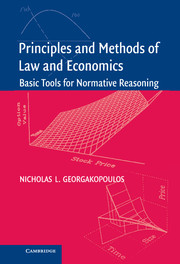Book contents
- Frontmatter
- Contents
- Preface
- INTRODUCTION: INNOVATION IN LEGAL THINKING
- PART 1 PRINCIPLES
- 1 FROM FORMAL LOGIC TO NORMATIVE REASONING
- 2 SOCIAL WELFARE VERSUS MORAL PHILOSOPHY
- 3 FROM POLITICAL PHILOSOPHY TO GAME THEORY
- 4 THE IMPORTANCE OF DISTRIBUTION OF WEALTH
- 5 COASE AND LAW'S IRRELEVANCE
- 6 MORE FAILURES OF COASEAN IRRELEVANCE
- PART 2 METHODS
- APPENDIX A MEINHARD V. SALMON 249 N.Y. 458 (1928)
- APPENDIX B GLOSSARY
- APPENDIX C MATHEMATICA NOTEBOOKS
- Index
5 - COASE AND LAW'S IRRELEVANCE
Published online by Cambridge University Press: 24 July 2009
- Frontmatter
- Contents
- Preface
- INTRODUCTION: INNOVATION IN LEGAL THINKING
- PART 1 PRINCIPLES
- 1 FROM FORMAL LOGIC TO NORMATIVE REASONING
- 2 SOCIAL WELFARE VERSUS MORAL PHILOSOPHY
- 3 FROM POLITICAL PHILOSOPHY TO GAME THEORY
- 4 THE IMPORTANCE OF DISTRIBUTION OF WEALTH
- 5 COASE AND LAW'S IRRELEVANCE
- 6 MORE FAILURES OF COASEAN IRRELEVANCE
- PART 2 METHODS
- APPENDIX A MEINHARD V. SALMON 249 N.Y. 458 (1928)
- APPENDIX B GLOSSARY
- APPENDIX C MATHEMATICA NOTEBOOKS
- Index
Summary
The late Professor Ronald Coase stated a counterfactual hypothesis that led to a revolution in legal thinking. This hypothesis, despite being against fact, produces an extraordinary hurdle for legal analysis, but it is an enormously powerful tool. The counterfactual hypothesis is that in an ideal world, all activity would be the optimal one. Changing the law would lead only to the adjustments that would return all activity to the optimal. Therefore, in such an ideal world, legal change and, by extension, law would be irrelevant. After explaining this counterfactual construct of Coasean irrelevance, this chapter shows how jurists in law and economics can use it to show that legal change is desirable. If a jurist can show that a new rule would lead to activity nearer the optimal than the current rule, this constitutes proof that at least that legal change must occur.
The facts of Meinhard v. Salmon help illustrate the importance of the potential irrelevance of law. Salmon received a lucrative offer from Gerry, a business acquaintance. The offer could have expanded Salmon's business. Unbeknownst to Gerry, Salmon's business, which was the reason for their acquaintance, had a secret partner, Meinhard. If Gerry knew that Salmon operated in two capacities, as an individual and as a member of a partnership, then Gerry may have specified which of the two he selected as the recipient of his offer. Meinhard, the invisible partner, claimed the offer should be treated as made to the partnership.
- Type
- Chapter
- Information
- Principles and Methods of Law and EconomicsEnhancing Normative Analysis, pp. 95 - 111Publisher: Cambridge University PressPrint publication year: 2005



